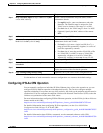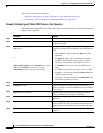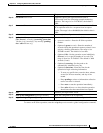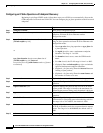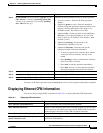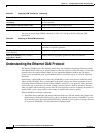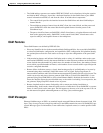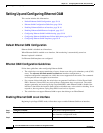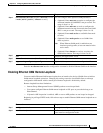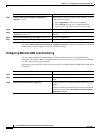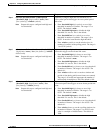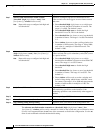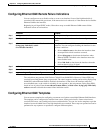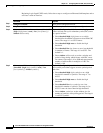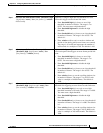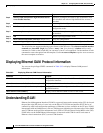
39-17
Cisco ME 3400 Ethernet Access Switch Software Configuration Guide
OL-9639-06
Chapter 39 Configuring Ethernet OAM, CFM, and E-LMI
Setting Up and Configuring Ethernet OAM
Enter the no ethernet oam interface configuration command to disable Ethernet OAM on the interface.
Enabling Ethernet OAM Remote Loopback
You must enable Ethernet OAM remote loopback on an interface for the local OAM client to initiate
OAM remote loopback operations. Changing this setting causes the local OAM client to exchange
configuration information with its remote peer. Remote loopback is disabled by default.
Remote loopback has these limitations:
• Internet Group Management Protocol (IGMP) packets are not looped back.
• You cannot configure Ethernet OAM remote loopback on ISL ports or ports that belong to an
EtherChannel.
• If dynamic ARP inspection is enabled, ARP or reverse ARP packets are not looped or dropped.
Beginning in privileged EXEC mode, follow these steps to enable Ethernet OAM remote loopback on an
interface:
Step 4
ethernet oam [max-rate oampdus | min-rate seconds
| mode {active | passive} | timeout seconds]
You can configure these optional OAM parameters:
• (Optional) Enter max-rate oampdus to configure the
maximum number of OAM PDUs sent per second. The
range is from 1 to 10.
• (Optional) Enter min-rate seconds to configure the
minimum transmission rate in seconds when one OAM
PDU is sent per second. The range is from 1 to 10.
• (Optional) Enter mode active to set OAM client mode
to active.
• (Optional) Enter mode passive to set OAM client
mode to passive.
Note When Ethernet OAM mode is enabled on two
interfaces passing traffic, at least one must be in the
active mode.
• (Optional) Enter timeout seconds to set a time for
OAM client timeout. The range is from 2 to 30.
Step 5
end Return to privileged EXEC mode.
Step 6
show ethernet oam status [interface interface-id] Verify the configuration.
Step 7
copy running-config startup-config (Optional) Save your entries in the configuration file.
Command Purpose
Command Purpose
Step 1
configure terminal Enter global configuration mode.
Step 2
interface interface-id Define an interface to configure as an EOM interface, and
enter interface configuration mode.



